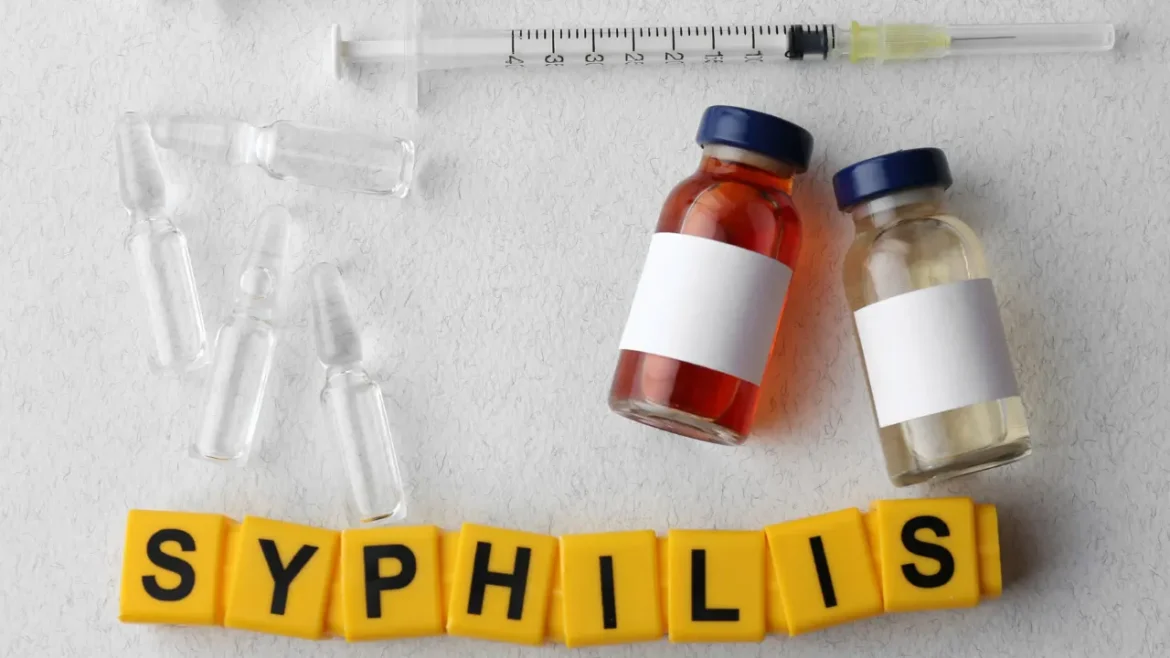Description
The spirochete bacteria named Treponema pallidum causes the sexually transmitted infection (STI) known as syphilis, which has become a problem for public health globally. Syphilis has different stages which include primary, secondary, latent, and tertiary stages. The initial stage is marked by the development of painless chancres or sores around the area of infection. Patients may present with flu-like symptoms, a rash, and inflamed lymph nodes during the secondary stage. The latent stage appears asymptomatic. However, the tertiary phase, which can develop years later, can cause serious consequences like cardiovascular and neurological issues.
You May Also Like:
MUSHROOMS FOR ATHLETES? THIS GAME-CHANGER MAY SURPRISE YOU
FINDING THE BEST LION’S MANE MUSHROOM SUPPLEMENT: 5 TOP BRANDS REVIEWED
Syphilis: Description, Causes, and Treatment Protocol is an original (HealthXWire) article.
Possible Causes
The bacteria Treponema pallidum is the source of the sexually transmitted disease syphilis. Although there are other potential causes and ways of transmission one should be aware of, it is most commonly spread through sexual contact. To stop the spread of syphilis, it is crucial to comprehend these causes and ways of transmission. The potential causes and transmission methods are listed below: –
Sexual Contact: Syphilis is most frequently spread by sexual intercourse, involving vaginal, oral, and anal sex. The risk of transmission is increased by direct interactions with syphilis chancres or sores on an affected person. The bacterium may enter the human body through mucous membranes or tiny skin injuries or abrasions.
Blood Transfusion: Blood transfusions can spread syphilis if the supplied blood is tainted with the pathogen, a rare but possible occurrence. Transfusion-associated syphilis risk has been greatly decreased because of rigorous screening processes and blood donation testing.
Mother-to-Child Transfer: During pregnancy or birth, syphilis-positive pregnant women might pass the disease to their unborn children. Congenital syphilis is what this is, and it may trigger severe health issues along with fetal death. To stop transmission from mother to child, pregnant women must receive sufficient prenatal care and undergo syphilis testing.
Vertical Transmission: Rarely, syphilis can be vertically passed from an infected woman to her fetus during pregnancy via the placenta. This would be extremely harmful to the newborn’s health.
Direct Interaction with Infected Lesions: Direct interaction with syphilis chancres or sores of an infected person can cause transmission. This can happen through actions like sharing contaminated items including sex toys or via touch during non-sexual activity when lesions exist.
Syphilis cannot be spread through innocuous interactions like eating from the same plate, hugging, or sharing a restroom. It is exceedingly improbable that transmission via casual contact will occur because the bacteria T. pallidum are weak and cannot thrive for long outside of the human body.
Unprotected intercourse, having several sexual partners, engaging in high-risk sexual practices, and using illegal drugs are all risk factors for contracting syphilis. These elements raise the possibility of bacterial exposure and syphilis transmission.
Exacerbating and Mitigating Factors
Like several other illnesses, syphilis can grow and impact a person’s health depending on a number of variables. Effective syphilis care, prevention, and control depend on the comprehension of these factors. Following are some important syphilis aggravating and reducing factors: –
Exacerbating Factors: –
Sexually Transmitted Infections (STIs) and Other Co-Infections: The development and spread of syphilis can be significantly impacted by co-infection with different other STIs, including HIV. HIV impairs immunological function, making people more prone to contracting syphilis and more likely to spread the disease to sexual partners.
Immunodeficiency: People with weakened immune systems, including those having HIV/AIDS or individuals on immunosuppressive therapy, are more susceptible to contracting and developing more severe types of syphilis. Immunodeficiency reduces the body’s capacity to generate a successful immunological response against the illness.
Substance Abuse: Alcohol and drug misuse are two substances that might make syphilis worse. These behaviors increase the possibility of syphilis transmission by encouraging risky sexual behaviors like unprotected intercourse or sharing intimate acts with several partners.
Late or Insufficient Treatment: Syphilis treatment that is insufficient or delayed can cause the disease to proceed to more advanced phases, raising the risk of serious complications. Receiving prompt and proper care in accordance with suggested protocols is essential.
Mitigating Factors: –
Early Identification and Diagnosis: Effective treatment and complication prevention for syphilis depend on early detection and rapid diagnosis. Syphilis can be identified early on and treated quickly with the use of routine screenings, especially for those who are at higher risk.
Safe Sexual Practices: Syphilis transmission risk is decreased by using condoms consistently and correctly. The transmission of syphilis can be considerably reduced by restricting the number of sexual partners while preventing risky behaviors including unprotected sex and having sexual relations with people who have had recent or risky sexual experiences.
Partner Information and Care: To avoid reinfection and stop the transmission of the infection in sexual networks, sexual partners must be informed of a syphilis diagnosis alongside encouraged to get tested and treated.
Education and Awareness: Syphilis incidence can be decreased through increasing public understanding of the disease, how it spreads, and effective prevention measures. Education campaigns aimed at high-risk groups, medical professionals, and the general population can encourage early identification, treatment seeking, and compliance with safe sexual behaviors.
Timely and Proper Treatment: In order to cure the infection completely, lower the danger of transmission, and stop the disease from progressing to more severe stages, it is essential to follow the suggested treatment protocols and finish the entire course of antibiotics as advised by medical authorities.

Standard Treatment Protocols
For getting rid of the root of the infection, Treponema pallidum, antibiotics are commonly employed to treat syphilis. Depending on the infection’s stage and personal circumstances, like allergies or other health issues, the exact treatment plan and length of time will vary. The typical protocols for treating syphilis at various stages include: –
Syphilis, including Primary and Secondary: This includes: –
- Benzathine penicillin G
For both primary and secondary syphilis, this is the recommended course of treatment. The drug is administered with one intramuscular injection while the dosage is based on the severity and length of the infection.
- Doxycycline or Tetracycline
Whenever benzathine penicillin G becomes unavailable or a patient has a penicillin allergy, these medicines can be utilized as a substitute. A 14-day course of therapy is typical.
Early and Late Stages of Latent Syphilis This includes: –
- Benzathine penicillin G
Depending on how long the infection has been present, a treatment plan for latent syphilis may be necessary. Weekly intervals may call for multiple benzathine penicillin G dosages.
- Doxycycline or Tetracycline
These antibiotics can be used as substitutes when benzathine penicillin G cannot be obtainable or when a patient has a penicillin allergy. The average treatment period is 28 days.
Tertiary Syphilis: This includes: –
- Benzathine penicillin G
Longer benzathine penicillin G courses may be necessary for the treatment of tertiary syphilis. The disease’s severity and consequences dictate the dose and frequency.


Treatment Options
Some adjunct treatment alternatives may be taken into consideration in addition to conventional antibiotic therapy. Following are some recommended adjunct therapies, though further research is needed to determine whether they are effective: –
Nutritional Supplements: It is crucial to remember that using prescription antibiotics that have been given by a medical practitioner is the main and most efficient method of treating syphilis and dietary supplements are offered as a way of supporting the pre-existing treatment plan. The dietary supplements that can be utilized are: –
- B-complex vitamins
The immune system and general well-being depend on B vitamins. They might aid the body’s recuperation by providing assistance.
- Vitamin C
Both collagen formation and immune system performance depend greatly on vitamin C. The immune system may be strengthened, and healing may be aided.
- Zinc
The immune system and the healing of wounds both benefit from zinc. The immunological response during syphilis therapy may be supported by adequate zinc levels.
Natural Remedies: Following are some natural treatments that have been investigated for their potential to be helpful in the treatment of syphilis: –
- Garlic
The antibacterial qualities of garlic are well-established. Although more research is required, it might have application as an adjuvant therapy for treating syphilis.
- Echinacea
Traditional uses of the plant echinacea include immune system strengthening. It might have antibacterial and anti-inflammatory qualities, according to some research.
Herbal Remedies: The following herbal treatments have been researched for their potential to be helpful in the treatment of syphilis: –
- Sarsaparilla
An herb called sarsaparilla has historically been used to treat syphilis. Although there is little scientific proof, it is thought to have antibacterial qualities.
- Chinese Herbal Medicine
Syphilis has been treated with certain herbal formulae from traditional Chinese medicine. The effectiveness and safety of such mixtures, however, need more research.
Nevertheless, it is crucial to stress again that herbal and natural treatments should never be used in place of conventional medicine, but rather as a supplement. Also, it is imperative to see a healthcare professional prior to using any herbal or natural remedies because they may negatively interact with other prescription medications or cause other adverse reactions.


Conclusion
Syphilis is caused by Treponema pallidum and is characterized by flu-like symptoms or painless sores around infected areas. Syphilis can progress into distinct stages and can impact various organ systems, resulting in a complex range of effects. Early diagnosis and immediate treatment are essential for effectively managing syphilis. Common treatments, including antibiotics, and different types and strengths of antibiotics were applied for different stages of syphilis. Regular follow-up and sex education are vital for monitoring treatment response and ensuring complete eradication of the infection.
The transmission of syphilis is not only limited to sexual transmissions, people with immunodeficiency or who are abusing substances are also susceptible to it. and other sexually transmitted infections. Collaborative efforts between healthcare providers and individuals affected by syphilis play a pivotal role in providing comprehensive care, addressing potential complications, and offering appropriate support and counseling. We must strive to minimize the long-term consequences of syphilis and enhance the overall well-being of those affected by this complex infectious disease.


Additional resources for further reference
https://www.cdc.gov/std/syphilis/stdfact-syphilis.htm
https://www.medicalnewstoday.com/articles/186656
https://www.aad.org/public/diseases/a-z/syphilis-overview
https://my.clevelandclinic.org/health/diseases/4622-syphilis
Important Note: The information contained in this article is for general informational purposes only, and should not be construed as health or medical advice, nor is it intended to diagnose, prevent, treat, or cure any disease or health condition. Before embarking on any diet, fitness regimen, or program of nutritional supplementation, it is advisable to consult your healthcare professional in order to determine its safety and probable efficacy in terms of your individual state of health.
Regarding Nutritional Supplements Or Other Non-Prescription Health Products: If any nutritional supplements or other non-prescription health products are mentioned in the foregoing article, any claims or statements made about them have not been evaluated by the U.S. Food and Drug Administration, and such nutritional supplements or other health products are not intended to diagnose, treat, cure, or prevent any disease.
Table of Contents


